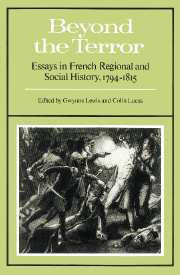Book contents
- Frontmatter
- Contents
- Contributors
- Preface
- 1 Cobb and the historians
- 2 The reconstruction of a church 1796–1801
- 3 Picking up the pieces: the politics and the personnel of social welfare from the Convention to the Consulate
- 4 Conscription and crime in rural France during the Directory and Consulate
- 5 Common rights and agrarian individualism in the southern Massif Central 1750–1880
- 6 Themes in southern violence after 9 thermidor
- 7 Political brigandage and popular disaffection in the south-east of France 1795–1804
- 8 Rhine and Loire: Napoleonic elites and social order
- Index
1 - Cobb and the historians
Published online by Cambridge University Press: 04 November 2009
- Frontmatter
- Contents
- Contributors
- Preface
- 1 Cobb and the historians
- 2 The reconstruction of a church 1796–1801
- 3 Picking up the pieces: the politics and the personnel of social welfare from the Convention to the Consulate
- 4 Conscription and crime in rural France during the Directory and Consulate
- 5 Common rights and agrarian individualism in the southern Massif Central 1750–1880
- 6 Themes in southern violence after 9 thermidor
- 7 Political brigandage and popular disaffection in the south-east of France 1795–1804
- 8 Rhine and Loire: Napoleonic elites and social order
- Index
Summary
‘Mr Cobb's real subject is anarchy.’
(Norman Hampson, English Historical Review, 80 (1965), 363)Present-day scholars who approach the history of France, and especially the history of the French Revolution, must negotiate three main ideological currents: first, the Anglo-Saxon tradition of empiricism, of which Richard Cobb provides an eccentric example; secondly, the French Marxist tradition of historiography; and thirdly, the influence (some would now say the imperialistic influence) of the Annales school. This triangular definition of the forces in play is, of course, a crude one, which shelters many exceptions. Anglo-Saxon Marxist historians do exist, but George Rudé seems in this respect a lonely example of a very rare species, occasionally sighted by careful readers of History Workshop or Social History. French historians are not necessarily Marxists or Annalists: Professor Jacques Godechot of Toulouse is one who has successfully managed to dodge the cross-fire. When, however, the student surveys the historiography of the French Revolution to consider general interpretations and approaches to research, these three influences appear to dominate the field.
Most British historians of the Revolution would be horrified to be told that they belonged to a school of thought. This might suggest to them that their individuality had been infringed, their personal integrity somehow compromised, their intellectual privacy violated. In recognition of these prickly susceptibilities, I refer not to an English or an Anglo-Saxon school, but to an Anglo-Saxon tradition. It is a tradition which envisages historical writing as a literary pursuit, and which abhors theoretical discussions and analytical systems. In one reviewer's phrase, it has exhibited the ‘native passion for unadulterated facts’. It has specialised in dismantling hypotheses and criticising general interpretations.
- Type
- Chapter
- Information
- Beyond the TerrorEssays in French Regional and Social History 1794-1815, pp. 1 - 20Publisher: Cambridge University PressPrint publication year: 1983

